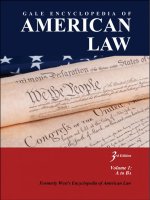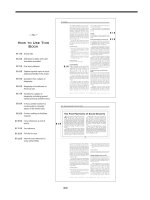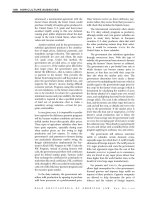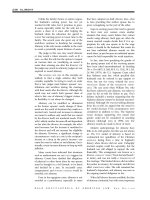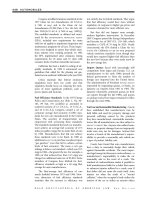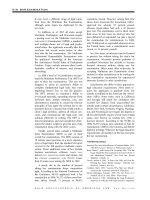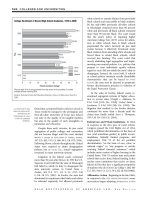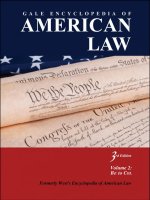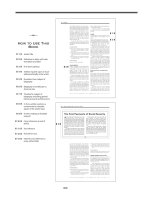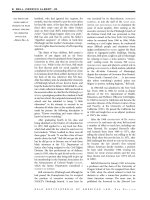Gale Encyclopedia Of American Law 3Rd Edition Volume 2 P2 pps
Bạn đang xem bản rút gọn của tài liệu. Xem và tải ngay bản đầy đủ của tài liệu tại đây (1.36 MB, 10 trang )
k
How to Use This
Book
1
1
2
4
3
2
3
4
5
6
7
8
9
10
11
12
13
XIII
5
6
7
9
10
13
12
11
8
GALE ENCYCLOPEDIA OF AMERICAN LAW, 3RD E DITION
XIV HOW TO USE THIS BOOK
Contributors
Editorial Reviewers
Patricia B. Brecht
Matthew C. Cordon
Frederick K. Grittner
Halle Butler Hara
Scott D. Slick
Contributing Authors
Richard Abowitz
Paul Bard
Joanne Bergu m
Michael Bernard
Gregory A. Borchard
Susan Buie
James Cahoy
Terry Carter
Stacey Chamberlin
Sally Chatelaine
Joanne Smestad Claussen
Matthew C. Cordon
Richard J. Cretan
Lynne Crist
Paul D. Daggett
Susan L. Dalhed
Lisa M. DelFiacco
Suzanne Paul Dell’Oro
Heidi Denler
Dan DeVoe
Joanne Engelking
Mark D. Engsberg
Karl Finley
Sharon Fischlowitz
Jonathan Flanders
Lisa Florey
Robert A. Frame
John E. Gisselquist
Russell L. Gray III
Frederick K. Grittner
Victoria L. Handler
Halle Butler Hara
Lauri R. Harding
Heidi L. Headlee
James Heidberg
Clifford P. Hooker
Marianne Ashley Jerpbak
David R. Johnstone
Andrew Kass
Margaret Anderson Kelliher
Christopher J. Kennedy
Anne E. Kevlin
John K. Krol
Lauren Kushkin
Ann T. Laughlin
Laura Ledsworth-Wang
Linda Lincoln
Theresa J. Lippert
Gregory Luce
David Luiken
Frances T. Lynch
Jennifer Marsh
George A. Milite
Melodie Monah an
Sandra M. Olson
Anne Larsen Olstad
William Ostrem
Lauren Pacelli
Randolph C. Park
Gary Peter
Michele A. Potts
Reinhard Priester
Christy Rain
Brian Roberts
Debra J. Rosenthal
Mary Lahr Schier
Mary Scarbrough
Stephanie Schmitt
Theresa L. Schulz
John Scobey
Kelle Sisung
James Slavicek
Scott D. Slick
David Strom
Linda Tashbook
Wendy Tien
M. Uri Toch
Douglas Tueting
Richard F. Tyson
Christine Ver Ploeg
George E. Warner
Anne Welsbacher
Eric P. Wind
Lindy T. Yokanovich
XV
v
BEAN, ROY
Roy Bean achieved prominence for his uncon-
ventional law enforcement procedures. His
methods for enforcing the law were question-
able and unorthodox.
Bean was born circa 1825, in Mason
County, Kentucky. His career included many
undertakings, not always legal. In 1847 he was
in charge of a trading post in Me xico. Accused
of cattle rustling in 1849, he was forced back to
the Unite d States. He was a member of a group
of vigilantes who fought for the Confederacy
during the
CIVIL WAR. Bean was a saloonkeep er
and a gambler in the postwar years. In 1882
Bean settled in Texas.
He changed the name of the Texas camp
where he lived from Vinegaroon to Langtry and
established himself as
JUSTICE OF THE PEACE.His
saloon was the courthouse where Bean presided
as judge, using a law book, a gun, his sense of
humor, and practical thinking as his guides to
making judicial decisions. Bean died March 16,
1903, in Langtry.
v
BEARD, CHARLES AUSTIN
Few academicians achieve the public recogni-
tion and professional respect accorded to
historian Charles Austin Beard. His polemic
An Economic Interpretation of the
CONSTITUTION
OF THE UNITED STATES
stirred debate among fellow
scholars and the U.S. public by contradicting
the popular understanding of how and why the
United States was founded. A brilliant, original
thinker, Beard achieved a unique prominence
among twentieth-century historians and politi-
cal scientists.
Beard was born to well-to-do parents in
Knightstown, Indiana, on November 27, 1874.
After graduating from Indiana’s DePauw Uni-
versity in 1898, he sailed to England to attend
Roy Bean 1825–1903
◆
◆◆
❖
❖
1825 Born,
Mason
County, Ky.
1835–36 Texas
Revolution
1847 Moved to Mexico to
manage a trading post
1845 Texas
admitted to the Union
1849 Accused of
cattle rustling;
returned to U.S.
1861–65 U.S. Civil
War; member of
Confederate vigilante
fighting group
1903 Died,
Langtry, Tex.
▼▼
▼▼
1825
1900
1875
1850
◆
1882 Became justice
of the peace for Pecos
County, Tex.
B
(cont.)
THAT’S MY RULIN’.
—ROY BEAN
1
the University of Oxford. While at Oxford, he
helped establish Ruskin Hall, a college for
British working men that represented to Beard
the liberation of the English masses from upper-
class domination. In Beard’s mind, Ruskin Hall
was a symbol and precursor of the true political
democracy that would be ushered in by the
industrial revolution.
In 1900 Beard returned briefly to the United
States to marry Mary Ritter. An intellectual in
her own right, Mary Ritter Beard became an
invaluable critic and collaborator in the more
than fifty books produced during Beard’sprolific
career. After his
MARRIAGE, Beard resumed his
studies in England, then returned permanently to
the United States. He earned his doctor’sdegree
from New York City’s Columbia University and
in 1904 accepted a teaching position in political
science at Columbia.
In 1913 Beard published An Economic
Interpretation of the Consti tution of t he United
States. The book crea ted a mild sensation
because it sugges ted that the United States was
not yet a true democracy. Even more disturbing
to some U.S. citizens was Beard’s argument that
the U.S. Constitution was designed primarily to
protect the property rights of the wealthy
capitalists attending the Constitutional Conven-
tion. He insisted that self-interest, not demo-
cratic principles, motivated the Founding
Fathers. To Beard, the Constitu tion was a
tribute to the power of class, not democracy.
Although several U.S. politicians criticized
Beard’s unorthodox view of U.S. history, many
of his colleagues praised his innovative ap-
proach. They understood how the private
economic interests of the colonial
RULING class
could have had a far-reaching effect on the
nascent U.S. government.
In 1917 Beard protes ted the firing of several
Columbia University faculty members by
resigning his own position. Beard had been
outraged when the university dismissed his
colleagues for their refusal to support the
United States’ involvement in
WORLD WAR I.In
1919 he helped found the New School for Social
Research in New York City.
In 1927 Beard produced another remark-
able tome, The Rise of American Civilization.
Coauthored by hi s wif e, it p rov ided an
overview of U.S. history with further insights
into the government’sorigins.Thissprawling,
two-volume set was fo llowed by America in
Charles Austin Beard 1874–1948
◆◆◆◆◆◆◆◆◆
❖
❖
1874 Born,
Knightstown, Ind.
1904 Received Ph.D. from Columbia
University; began teaching there
1898 Graduated
from DePauw
University
1899
Established
Ruskin Hall
1914–18
World War I
1913 Published
An Economic
Interpretation
of the Constitution
of the United States
1917 Resigned teaching
position at Columbia
1919 Helped
found the New
School for
Social Research
1927 Co-authored
The Rise of
American
Civilization with
wife, Mary
1939
America in
Midpassage
published
1939–45
World War II
1946 American Foreign Policy in the
Making, 1932–1940 published
1948 Died,
New Haven,
Conn.
▼▼
18751875
19501950
19251925
19001900
▼▼
Charles Austin Beard.
LIBRARY OF CONGRESS
GALE ENCYCLOPEDIA OF AMERICAN LAW, 3RD E DITION
2 BEARD, CHARLES AUSTIN
Midpassage, in 1939, and The American Spirit,
in 1942.
During the early 1930s Beard wrote exten-
sively about the nature of historical knowledge.
He was particularly interested in historians’
personal biases and the effect of those biases on
the presentation of historical facts.
Although Beard was closely associate d with
the U.S. progressive movement and social
reforms, he disagreed with several aspects of
Franklin D. Roosevelt’s
NEW DEAL programs. In
1934 he began an acrimonious, decade-long
campaign against Roosevelt’s foreign policy. In
American Foreign Policy in the Making, 1932–
1940 (1946) and President Roosevelt and the
Coming of War (1948), Beard maintained that
the United States had backed Japan into a
corner and had forced the country into a war.
His extreme isolationist views damaged his
professional reputation to some extent.
Beard died in 1948, at the age of seventy-
three. He is remembered as an accomplished
historian who influenced the way U.S. citizens
view their own history.
FURTHER READINGS
Noble, David W. 1985. The End of American History.
Minneapolis: Univ. of Minnesota Press.
Philbin, James P.2000. “Charles Austin Beard: Liberal Foe of
American Internationalism.” Humanitas 13 (September).
Snider, Keith F. 2000. “Rethinking Public Administration’s
Roots in Pragmatism: The Case of Charles A. Beard.”
American Review of Public Administration 30, no. 2
(June). Available online at />content/abstract/30/2/123; website home page: http://
arp.sagepub.com (accessed July 6, 2009).
CROSS REFERENCES
Constitution of the United States; Constitution of the
United States “Constitut ional Convention of 1787” (Side-
bar); Constitution of the United States “Federalists vs. Anti-
Federalists ” (In Focus).
BEARER
One who is the holder or possessor of an
instrument that is negotiable—for example, a
check, a draft, or a note—and upon which a
specific payee is not designated.
A
NEGOTIABLE INSTRUMENT that is payable to
“bearer” or to “cash” or to “the order of cash,”
that is, not naming a payee, is a bearer
instrument, and is called “bearer” paper.
v
BEASLEY, MERCER
Mercer Beasley was an eminent New Jersey
jurist. He was born March 27, 1815, in
Philadelphia, Pennsylvania, to Frederick and
Maria Beasley. He studied at the College of New
Jersey (now Princeton) but only for a year, after
which he studied the law. He was admitted to
the bar in 1838 and established a successful legal
practice in Trenton, New Jersey. He became
active in local politics, first as a Whig and later
as a Democrat, before pursuing a career in the
judicial system.
On March 8, 1864, the governor appointed
Beasley to a seven -year term as the New Jersey
high court’s chief justice. Four succeeding gov-
ernors retained him, allowing Beasley to serve
on the bench for almost 33 years. He gained
prominence for his equitable decisions, particu-
larly those concerning political dissent.
Beasley died from pneumonia on February
19, 1897, in Trenton.
v
BECCARIA, CESARE BONESANO,
MARCHESE DI
Cesare Bonesano Beccaria was an expert in law
and economics and put forth new principles
in both fields which were widely accepted
throughout Europe.
Mercer Beasley 1815–1897
◆◆◆◆◆◆
◆
◆◆
◆
❖❖
1815 Born,
Philadelphia, Pa.
1816 Indiana
became 19th state
in the Union
1834 Began clerkship with Samuel L.
Southard, U.S. Senator and lawyer
1830 Beasley
family moved to
Trenton, N.J.
1838
Admitted
to New
Jersey bar
1849 Argued
his first case
before New
Jersey
Supreme
Court:
Delaware &
Raritan Coal
Co. v. Lee
1850 Ran
unsuccessfully
for mayor of
Trenton
1858 Appointed
chancery reporter
for New Jersey
1861–65
Civil War
1864 Appointed chief
justice of New Jersey
1876 Centennial year of
United States; Colorado
joined the Union
1896 Utah
became 45th state
in the Union
1897 Died,
Trenton, N.J.
▼▼
▼▼
18251825
18001800
18501850
18751875
19001900
GALE ENCYCLOPEDIA OF AMERICAN LAW, 3RD E DITION
BECCARIA, CESARE BONESANO, MARCHESE DI 3
Beccaria was born March 15, 1738. He
taught law and economics in Milan. He
vehemently opposed
CAPITAL PUNISHMENT and
cruel treatment of prisoners. His economic
theories concerned wages and la bor and influ-
enced such eminent economists as Adam Smith
and Thomas Robert Malthus.
In 1771 Beccaria served as councilor of state
and magistrate; in 1790, he was a member of a
committee that advocated reform of criminal
and
CIVIL LAW in Lombardy.
Beccaria’s ideas were published in 1764 in
his Essay on Crimes and Punishments. The book
was well received throughout Europe and
greatly influenced changes in European eco-
nomic and legal systems. He died November 8,
1794, in Milan.
v
BECKET, SAINT THOMAS
Saint Thomas Becket was chancellor of England
and archbishop of Canterbury during the reign
of Henry II and was martyred following a bitter
battle with the monarchy over royal control of
church law.
Becket was born around 1118 in London,
England, the son of a prosperous London
merchant and his wife who were of Norman
ancestry. He was first educated at a monastery
in Merton, just outside London, and then in
London grammar schools. In his late teens, he
was sent to Paris for further schooling, includ-
ing the study of logic, rhetoric, and philosophy.
At age twenty-one, after his mother had died
and his father had lost his fortune, Becket
returned to London and became a city clerk to
three sheriffs. Three years later, in about 1143,
his father introduced him to Theobald, arch-
bishop of Canterbury. Becket soon joined
Theobald’s household, becoming a clerk and
later a close adviser to the archbishop. In about
1150, Theobald sent Becket to Italy and France
to study civil and
CANON LAW. Upon his return to
Theobald’s court in 1152, Becket was able to
secure the papal letters that prevented the
English king Stephen from crowning his son
to be successor to the throne . Becket’s interven-
tion permitted Henry II, in 1154, to become the
king of England.
In the same year, Theobald appointed
Becket archdeacon of Canterbury. Less than
three months later, on Theobald’s recommen-
dation and in gratitude for Becket’srolein
helping him to gain the throne, Henry II named
Becket chancellor of England.
Becket became the king’s most trusted
adviser and a constant and devoted companion.
He was an effective chancello r, leading troops
into war, repairing castles, conducting foreign
policy, and negotiating a
MARRIAGE between
Prince Henry, son of the king, and the daughter
of King Louis VII of France. Becket lived
luxuriously, holding extravagant receptions
and dressing in splendid clothes. Theobald
disapproved of his protégé’s lavish lifestyle. To
Theobald, it was inappropriate for Becket, who
still remained archdeacon while serving as
chancellor, to surround himself with worldly
things. Becket ignored the concerns of his
mentor and even refused to visit Theobald on
his deathbed.
After Theobald died in 1161, Henry
appointed Becket archbishop of Canterbury in
1162. Becket, aware of the influence he now
wielded as a religious leader, promptly aban-
doned the trappings of his previous life as
chancellor. He devoted himself to the study of
Marchese di Cesare Bonesano Beccaria 1738–1794
◆
◆
◆◆◆
❖❖
1713 Treaty of
Utrecht transferred
Spanish possessions
in Italy to Austria
1738 Born,
Milan, Italy
1764 Essay on Crimes and
Punishments published
1768 Appointed professor of
political philosophy
1771 Served
as councilor
of state and
magistrate
1790 Served on
committee that
advocated criminal
and civil law reform
in Lombardy (Italy)
1789 French
Revolution began
1794 Died,
Milan, Italy
1796–97
Napoleon's
Italian
campaign
▼▼
▼▼
17251725
17001700
17501750
17751775
18001800
◆
GALE ENCYCLOPEDIA OF AMERICAN LAW, 3RD E DITION
4 BECKET, SAINT THOMAS
canon law and to the spiritual obligations of his
new role. He also became involved in a series of
clashes between the church and the state that
put him at odds with King Henry, his closest
friend and confidant.
In late 1163 Henry decided to abolish certain
privileges enjoyed by the clergy, which exempted
them, when they were accused of crimes, from
the jurisdiction of the civil courts. Criminous
clerks, as they were known, were instead allowed
to stand trial before a bishop in the ecclesiastical
(church) courts, which usually resulted in much
milder punishments. Under Henry’s reforms, an
accused clerk would be required to appear first in
a civil court to answer the charges. If the clerk
denied the offense and asked to be heard in an
ecclesiastical court, the clerk would then appear
before a bishop. If convicted by the ecclesiastical
court, the clerk would return to the civil court to
face charges as a layperson.
Becket vehemently opposed Henry’smea-
sures. He maintained that they subjected the
clergy to be punished twice for the same offense:
the clergy, he argued, would lose their clerical
status in the
ECCLESIASTICAL COURTS and would
also face secular penalties imposed by the civil
courts. However, under intense pressure from
the monarchy, Becket eventually relented and
agreed verbally to Henry’s proposals.
In January 1164 Henry summoned a
convocation at Clarendon, where he planned
to put his reforms into a document known as
the
CONSTITUTIONS OF CLARENDON, and to secure
Becket’s signature. But at the last minute,
Becket repudiated his previous verbal agree-
ment to the measures and refused to sign the
documents, on the grounds that they violated
canon law. Becket’s defiance incurred the wrath
of the king, who denounced him as a traitor to
the throne. Henry then threatened to imprison
Becket or at least force him to resign as
archbishop. Becket, fearing for his safety, fled
to France in late 1164 and remained in exile at
Flanders for the next six years. In France, Becket
struck back at Henry by excommunicating
several of his councilors and threatening to
excommunicate the king as well.
In 1169 Henry and Becket attempted a
reconciliation, but Henry soon incensed Becket
by having Roger, the archbishop of York and a
rival of Becket’s, crown Prince Henry as his
successor. Such coronations were traditionally
undertaken by the archbishop of Canterbury.
Becket retaliated by suspending Roger and
the other bishops who participated in the
coronation.
In late 1170 Henry and Becket briefly
resolved their differences and Becket returned
to Canterbury amid great fanfare. Almost
immediately, however, officers of the king
demanded that Becket absolve the suspended
bishops involved in Prince Henry’s coronation.
Becket steadfastly refused, maintaining that only
the pope had the authority to give absolution.
The king, by now exasperated with Becket,
is said to have uttered, in a fit of anger, “Will
nobody rid me of this turbulent priest?” Four of
his knights took his
PLEA literally and on
December 29, 1170, went to Canterbury, where
they confronted Becket in the cathedral and
again demanded that he absolve the suspended
bishops. Becket refused. The knights beat him
over the head repeatedly with their swords until
he died.
Saint Thomas Becket c. 1118–1170
◆
◆◆◆
◆
◆
◆◆◆
◆
❖❖
1118 Born,
London, England
1135 Stephen crowned
King of England
1140 Became clerk
to three sheriffs
1143 Joined household of Theobald,
Archbishop of Canterbury
1150 Theobald
sent Becket to
Italy and
France to
study civil and
canon law
1154 Henry II crowned King of
England; Becket named chancellor
1161
Theobald died
1162
Appointed
archbishop of
Canterbury
1164 Convocation at Clarendon;
Becket fled to France
1170 Returned to Canterbury;
murdered in Canterbury cathedral
1173 Canonized
by Pope Alexander II
1189 King
Henry II died
▼▼
▼▼
11251125
11501150
11751175
12001200
11001100
IF IT BE A QUESTION
OF TEMPORAL
MATTERS
, WE
SHOULD RATHER FEAR
THE LOSS OF SOULS
THAN OF
TEMPORALITIES
.
—THOMAS BECKET
GALE ENCYCLOPEDIA OF AMERICAN LAW, 3RD E DITION
BECKET, SAINT THOMAS 5
Word of Becket’s MURDER spread quickly,
and his tomb soon became a shrine visited by
thousands of pilgrims. Becket, in his early fifties
at the time of his death, was canonized by Pope
Alexander II in 1173. Henry II did penance at
Canterbury and was absolved of the murder.
The four assassins did fourteen years’ service in
the Holy Land as penance for the crime. A later
English king, Henry III, had Becket’s remains
placed in a more elaborate tomb at Canterbury,
which remained a popular place of pilgrimage.
The religious journeys to Becket’s tomb became
the basis for Chaucer’s masterpiece Canterbury
Tales, which was written almost two hundred
years after Becket’s death.
In 1538 Henry VIII became embroiled in his
own struggles with the church and viewed the
pilgrimages to Becket’s tomb with increasing
hostility. As a result, he had the shrine destroyed
and repor tedly had Becket’s bones burned.
FURTHER READINGS
Barlow, Frank. 1986. Thomas Becket. Berkeley: Univ. of
California Press.
Knowles, David. 1971. Thomas Becket. Stanford, Calif.:
Stanford Univ. Press.
Staunton, Michael. 2001. The Lives of Thomas Becket. New
York: Manchester Univ. Press.
v
BEECHER, HENRY WARD
Henry Ward Beecher was one of the most
prominent U.S. ministers of the nineteenth
century as well as an active participant in
various reform movements.
Beecher was born June 24, 1813, in Litch-
field, Connecticut. He was the son of preacher
Lyman Beecher and the brother of
HARRIET
BEECHER STOWE
, author of Uncle Tom’s Cabin . He
studied at Amherst College and Lane Theologi-
cal Seminary and served as a novice minister in
Indiana before becoming minister at the Ply-
mouth Congregational Church in Brooklyn, New
York, in 1847. A liberal thinker, Beecher was in
favor of such principles as women’s suffrage,
ABOLITION of SLAVERY, and acceptance of the theory
of evolution and often lectured on these and other
controversial ideas from the pulpit.
Beecher excelled as a speaker and in 1863 he
went on a lecture tour throughout England and
spoke in support of the Union position in the
CIVIL WAR.
In 1875, Beecher, regarded as one of the
United States’ foremost preachers, was involved
Henry Ward Beecher.
LIBRARY OF CONGRESS
Henry Ward Beecher 1813–1887
1813 Born,
Litchfield, Conn.
1834 Graduated from
Amherst College
1838 Ordained by New School
Presbytery of Cincinnati
1847 Became minister
at Plymouth
Congregational Church
in Brooklyn, N.Y.
1858 Life
Thoughts
published
1861–65
U.S. Civil War
1863 Went on
lecture tour of
England
1884 Joined
Republican
Mugwumps
campaigning for
Grover Cleveland
1887 Died,
Brooklyn, N.Y.
◆◆◆◆
◆
◆
❖❖
▼▼
▼▼
18251825
18501850
18751875
19001900
18001800
IT USUALLY TAKES A
HUNDRED YEARS TO
MAKE A LAW
, AND
THEN
, AFTER IT HAS
DONE ITS WORK
, IT
USUALLY TAKES A
HUNDRED YEARS TO
GET RID OF IT
.
—HENRY BEECHER
GALE ENCYCLOPEDIA OF AMERICAN LAW, 3RD E DITION
6 BEECHER, HENRY WARD
in a sensational trial that damaged his honor.
Journalist Theodore Tilton accused the minister
of committing adultery with Mrs. Tilton.
Beecher was expertly defended by his attorney,
WILLIAM M. EVARTS, and, after a lengthy trial, the
jury could not agree on a
VERDICT. Beecher’s
church proclaimed him the victor and officially
cleared him of the charges. In spite of the
scandal, Beecher continued to be an influential
force in the U.S. ministry until his death on
March 8, 1887, in Brooklyn.
BELIEF
Mental reliance on or acceptance of a particular
concept, which is arrived at by weighing external
evidence, facts, and personal observation and
experience.
Belief is essentially a subjective feeling about
the validity of an idea or set of facts. It is more
than a mere suspicion and less than concrete
knowledge. Unlike suspicion, which is based
primarily on inner personal conviction, belief is
founded upon assurance gained by empirical
evidence and from other people. Positive
knowledge, as contrasted with belief, is the
clear per ception of existing facts.
Belief has been defined as having faith in an
idea or formulating a conclusion as the result of
considering information.
INFORMATION AND BELIEF
is a legal term that is used to describe an
allegation based upon
GOOD FAITH rather than
firsthand knowledge.
v
BELL, DERRICK ALBERT, JR.
Derrick Albert Bell Jr. was the first tenured
black law professor at Harvard Law School,
a renegade civil rights scholar and proponent
and a prolific author of civil rights-related
works, including the critically acclaimed books
And We Are Not Saved: The Elusive Quest for
Racial Justice (1987) and Faces at the Bottom of
the Well: The Permanence of Racism (1992).
Bell was born November 6, 1930, in
Pittsburgh. The seeds of his views on racial
injustice—and his response to racial bigotry
and prejudice—were sown in the Great Depres-
sion. When he was five years old, he watched
his mother, Ada Elizabeth Bell, demand that
the family’s landlord fix the rotted stairs behind
their apartment. His mother finally told the
Derrick A. Bell Jr.
NEVILLE ELDER/CORBIS.
Derrick Albert Bell Jr. 1930–
▼▼
▼▼
1930
2000
1975
1950
◆
◆
❖
1930 Born,
Pittsburgh, Pa.
1939–45
World War II
1950–53
Korean War
◆
1954 Brown v.
Board of Education
decided by U.S.
Supreme Court
1961–73
Vietnam War
◆
1957 Graduated from U. of
Pittsburgh School of Law
◆
1969 Joined
Harvard University
Law School faculty
1981–85 Served as
dean of U. of Oregon
School of Law
1987 And
We Are
Not Saved
published
2004 Silent
Covenants published
◆
2002 Ethical Ambition
published
◆
1996 NYU Law School established
annual Derrick Bell Lecture on Race
in American Society
◆
1994 Confronting Authority published
◆
1991 Appointed visiting
professor at NYU Law School
◆
1990 Took unpaid leave of
absence from Harvard to protest
adverse minority hiring practices
◆
1971 Became
first tenured
African American
faculty member at
Harvard Law School
◆
1960 Joined NAACP Legal Defense Fund;
became first assistant counsel of
Defense Fund NYC branch
GALE ENCYCLOPEDIA OF AMERICAN LAW, 3RD E DITION
BELL, DERRICK ALBERT, JR. 7
